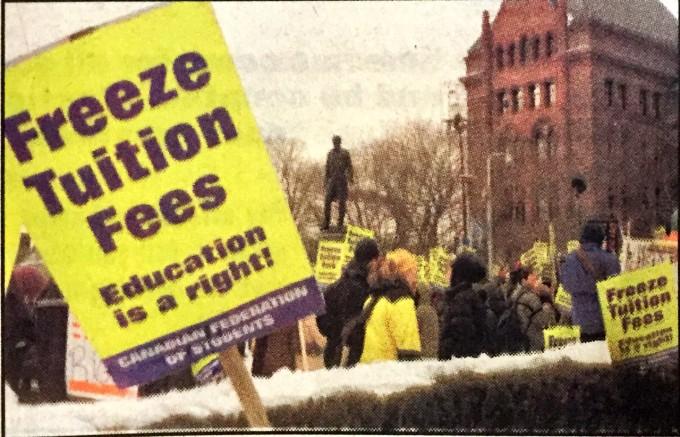By Sutton Eaves
Reducing or eliminating tuition fees would end up leaving the current poor paying for the future rich, says president of the Ontario PC Campus Association (OPCCA).
“The graduates of tomorrow, destined to make above average incomes, are having their tuition subsidized by the average tax payer and ultimately today’s poor,” says Adam Daifallah, who is also a fourth year politics student at Queen’s University as well as president of the OPCCA.
In a press release sent out on the National Student Day of Action, Daifallah condemned the event and attempted to present the other side of the tuition fee debate.
By asking the government to incur more or all of the cost of a student’s post-secondary education, Daifallah says taxpayers will suffer.
Rick Telfer, the national executive representative for the CFS’s Ontario branch, says that’s ridiculous as Canada uses a progressive system of taxation that wouldn’t hold lower-income earners accountable for financing post-secondary education.
“It’s not really a matter of taxes going up,” says Telfer. “Reallocation of existing tax income, or not actually going through with planned tax cuts, is what we’re looking for.”
Ashvin Bapat, president of Ryerson’s Business Student’s Association, says that while he wishes the cost of university was lower, the concept of “free tuition” is a misnomer.
“Someone has to pay, and the burden will fall on the general taxpayer.”
Bapat says he believes university tuition costs should be capped and kept at a “reasonable rate.” But there’s no way students should expect to go to school for free. Without tuition revenue, he questions how the university would even pay for a professor’s salary.
“If you can’t afford to pay them they simply won’t come here,” says Bapat. “And without them, we get no education.”
Daifallah believes that if students budget properly, work over the summer and during the school year, and take out small student loans, university is entirely affordable. He says it is for this reason students should bear the burden of paying for their education.
“Students are the primary beneficiaries,” says Daifallah. “It (university education) increases your value in the job market, your salary and ultimately your individual lifestyle. So, they should be expected to pay for it.”
But Telfer argues that education is not a privilege, but rather a right, and that the current inequality of access and opportunity infringes upon that right.
“Those who work during school have less time to spend on their studies,” he says. “They are then less likely to excel academically and less likely to have access to merit-based scholarships. It’s a vicious cycle.”












Leave a Reply